March 26th is the anniversary of the body of King Richard III being reburied in Leicester Cathedral in 2015. We all know what that was the trigger for. But was that recovery the greatest in our history? Or was there another season with an even more unlikely escape from relegation? That's the question to be answered in this thread - a countdown of Leicester's Top Five Greatest Escapes:
5) 1974/75
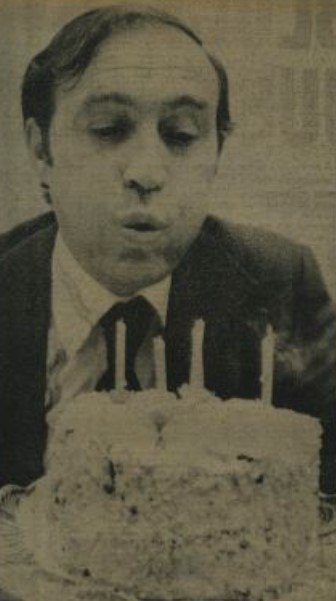
This picture of Jimmy Bloomfield celebrating his 41st birthday appeared in the papers in February 1975. But his expression looks more like exasperation than celebration. Everything was going wrong. Frank Worthington had gone 16 League games without a goal. Peter Shilton had left for Stoke City and replacement Mark Wallington had broken his wrist. Keith Weller had asked for a transfer, then refused to play the second half of a home defeat to Ipswich after being barracked by fans. The players no longer wanted Weller as captain. Results on the pitch reflected the off-field disharmony - on the morning of February 22nd, after 13 games without a win, and less than a year after being hailed as the most exciting team in the League, the table revealed the grim reality:
Three up / three down had been introduced this season, so the gap to safety, rather than being a single point to Carlisle in 20th, was a massive six points to Spurs in 19th (and there were only two points for a win then). That day we headed for White Hart Lane. It was a great chance for Spurs to pull further away from danger - and to bang another nail in the Leicester coffin.
It didn't work out like that. We cruised to a 3-0 victory - the scorers Jon Sammels, Mike Stringfellow (his last for the club) - and Frank Worthington, finally back in the goals.
After the game Alan Birchenall put the boot in: 'We've got problems, but not as many as they have. That's the worst Spurs team I've ever seen'.
The mood at the club lifted. The following week, in place of 'crisis' headlines, we got this:
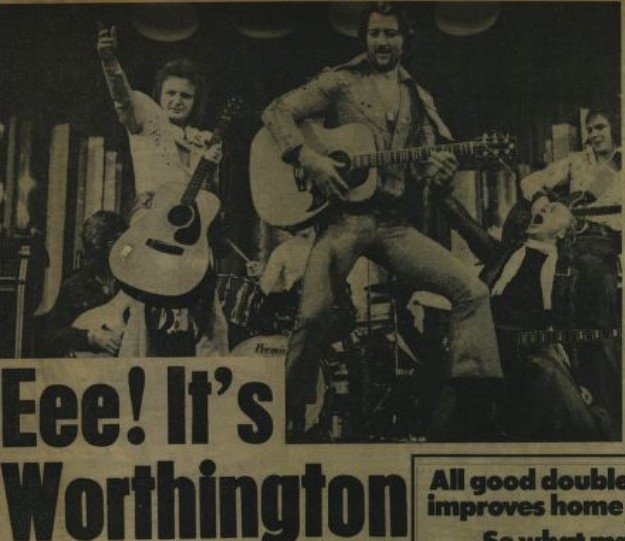
That's Frank on stage at a Grumbleweeds concert in the city. The day that picture appeared, Frank got the winner at Carlisle. So that was two crucial away wins in eight days - the start of a run of just one defeat in eleven games. Pretty soon we were above Spurs. Our key players were new names - Bob Lee, finally given a run in the team, and new signings Jeff Blockley and Chris Garland. Highlights of the run-in were a 2-2 draw at European Cup finalists Leeds United, and Garland's hattrick in a 3-2 home win v Wolves.
We finished in 18th place, three points clear of the drop, with Spurs 19th and Carlisle, Chelsea and Luton going down.
4) 1983/84
After getting promoted so spectacularly the previous season, Gordon Milne must have been confident that the Lineker / Smith / Lynex combination could terrify a few defences in the top flight too. What a shock we all got.
Mark Wallington was the only survivor of the 74/75 escape, but a contract dispute meant he sat out the first five games, giving new signing Mark Grew a chance. It was quite a baptism. The first two games were home defeats to Notts County (4-0) and Luton Town (3-0). Here's where I introduce my own form of illustration. I used to make little doodles in my school exercise books - and I still have this effort that tells the story:
The caption reads: Which way does Mark Grew turn? Shots from long range fly to every corner in his first 2 City games. It's a bit hard to blame Grew, given that he was defending a goal which, judging from the lines on the page, appears to be 12 yards high.
Here's a picture of that Martin O'Neill goal (the Mercury's attempt to photoshop the ball into the picture just as amateurish as my cartoon):
Things didn't improve. We lost the next four as well - the worst start in our history, and after 10 games we had just TWO points:
Then it all started to click. Lineker started scoring, Bob Hazell was bought to strengthen the defence, and gradually we realised we could hold our own against anyone. A run of seven unbeaten around Christmas took us out of the bottom three, and we ended up relatively comfortably in 15th after some scintillating performances like the 3-3 draw with Liverpool (which could be in a different Top 5 - the greatest games ever seen at Filbert Street).
3) 1932/33
If you saw the recent thread about the Rapid Vienna game you'll be familiar with this one. It's February and we still have only two wins to our name. Look at the table and you can see that if three points for a win had been in place then we'd have been in even deeper trouble. Four points adrift at the bottom was bad enough:
Then, after the Austrians gave us a footballing lesson and a few bits of advice, we altered our formation and went on a great run, safety assured on the last day with a 6-2 win v West Brom. Here's a photo from the 1-1 draw v champions Arsenal in March, the Gunners having received permission to change their kit to a new white-sleeved design just the week before:
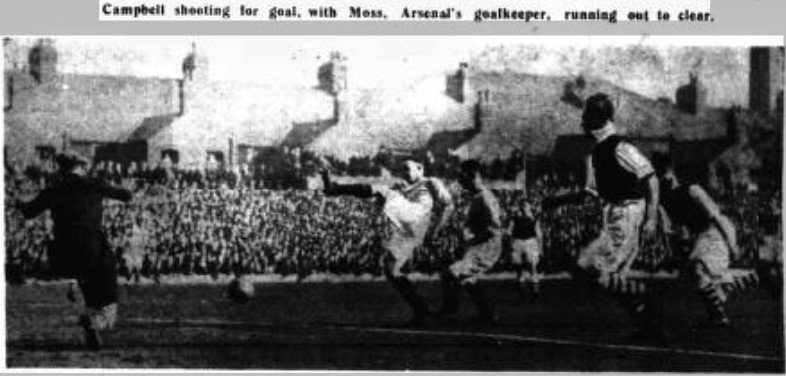
Just a word of explanation before the top two greatest escapes - we're not talking necessarily about last day dramas here, but taking a longer perspective, looking at moments across a whole season when we looked utterly doomed. So just missing out on this Top 5 were Tony James v Oxford in 1991 and Ian McNeill's similarly dramatic winner at Birmingham in 1958.
Right, on we go:
2) 2014/15
What?? Not number one?
Here's a reminder of how the Premier League stood when King Richard was buried. We had nine games to play:
We had won only twice since September, and it was now early April. But one thing that might have given us hope was that of the fixtures remaining, six out of nine were at home, many of them against teams with little left to play for. It's a familiar story so I'll just round this part off with a single photo, of what many cite as THE crucial moment in the whole Leicester City title miracle story:
1) 1958/ 59
Matt Gillies had been in the job six months. But how long would he last? This was the table on the morning of March 27th as we headed for Burnden Park, Bolton:
Leicester had lost six in a row and looked doomed. One bookie was offering odds of 50-1 against us staying up. Just like 2014/15, the darkest hour came with nine games to play. The five point gap to safety here was the equivalent of the seven point gap in 2014/15 (with three points for a win). We were dead and buried, surely, and there was no King Richard to save us. Were there any other useful omens? Well, it was Good Friday...
Portsmouth, our partners in misery at the bottom, threw in the towel. From that point they lost all their remaining games, and didn't get back to the top flight for 30 years. Would the same have happened to us had we gone down? No Ice Kings? No Cup Finals in the 60s? That's how much may have been riding on our finding a way to stay up.
Given the drama of the run-in, it's a story with a surprisingly minor place in Leicester City mythology. And it's one that needs telling in some detail...
That Good Friday, a seventh straight defeat looked a certainty when Nat Lofthouse put Bolton 3-1 up after just half an hour. But in the second half, Ken Leek pulled one back, 'heading down in wonderful style from a corner'. Then Leicester were awarded a penalty for handball, and John Ogilvie, who had never scored in his previous 83 games for City, was given the job. The pressure must have been unimaginable. Ogilvie stepped up and hit the ball so hard that it rebounded from the stanchion at the back of the net and landed at his feet. It finished 3-3. Elsewhere, Aston Villa took the lead at White Hart Lane but Spurs came back to win 3-2, moving them away from trouble, but cutting Villa's cushion over Leicester to four points.
The next day, Easter Saturday, saw Leicester and Portsmouth meet at Filbert Street. Only 15,000 turned up, perhaps understandable when we hadn't won a match for three months. That day the dismal run was broken - City won 3-1, with another Ogilvie penalty. Villa were playing at Everton that day, and again they took the lead before throwing it away, losing 2-1. The gap was now just two points. Easter Monday saw the reverse of the Good Friday fixtures. We drew 0-0 at home to Bolton, while Villa drew 1-1 at home to Spurs, so it was 'as you were', with six games to play.
Our next fixture was the big one. Saturday April 4th, Villa Park. On the morning of the match came the tragic news that Jeff Hall, Birmingham's England international defender, had lost his battle with polio. Thousands of City fans were heading for Birmingham (surely 24 year old Bernie Henson was among them, either cycling or hitch-hiking). They would have heard the terrible news on the way to the game or when they arrived at the ground. Leicester and Villa fans stood side by side for a minute's silence, in tribute to one of the game's most respected figures. Then the action began.
We got off to a great start. This description of Jimmy Walsh's opener sounds uncannily like Jamie Vardy's famous goal at West Brom in 2015.
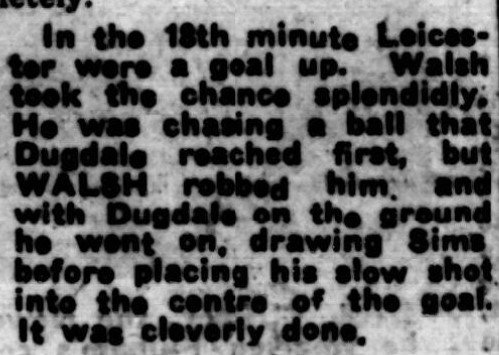
Keeper Dave MacLaren was keeping Villa at bay with some magnificent saves, and then midway through the second half Walsh got another. This one sounded equally dramatic:
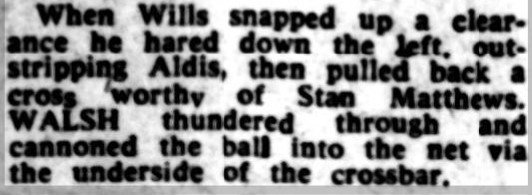
Villa pulled one back, but we held on to win 2-1 - one of the most important results in the history of the club. But despite taking six points from four games, we were still in the drop zone. Villa's goal average was better than ours - they were 20th, we were 21st. Manchester City had also slipped right into trouble after an awful run. They were just one point better off in 19th.
Here's what happened next:
Sat April 11th
Leicester City 1 West Ham 1. Tommy McDonald gave us the lead but John Bond (yes, him) got a late equaliser. Fortunately, for the third away game running Villa threw away a lead, Preston coming back to win 4-2. Finally we were out of the bottom two.
Sat Apr 18th
Nottingham Forest 1 Leicester City 4. The unbeaten run stretches to six with this fine win at the City Ground. Goals from Jimmy Walsh, Ken Keyworth, Tommy McDonald, then a Bill Whare own goal, 'the last straw for the home fans, who streamed out of the ground in their hundreds'. Villa got a point at home to Burnley, and Man City lost 2-1 at Blackburn so we climbed another place to 19th.
Mon Apr 20th
A great day for us without even playing. Some thought Forest been taking it easy against us with the FA Cup Final approaching, but that theory was disproved when they beat Villa 2-0 two days later. There was more good news. Man City lost yet again - 5-1 at West Ham, leaving the table like this:
Leicester City 39 30
Aston Villa 40 28
Man City 40 28
Portsmouth 40 21
Was the pressure off? Not with our remaining games against the top two in the League, Wolves and Man United, followed by a trip to Maine Road. It was still all to play for.
Wed Apr 22nd
We head for Molineux, where Wolves need a point to retain the title. We formed a guard of honour as they took the field, but there the respect ended. In the first half, we actually played Wolves off the park. In an extraordinary 15 minute spell, clever build up play gave Ken Keyworth four one-on-ones with the keeper. Somehow he contrived to miss all of them - hitting two wide, one onto the roof of the net, and then dallying too long, allowing a defender to get back and tackle. What was going on? Had Wolves decided he wasn't worth marking? After the break Wolves took over, and ended up winning comfortably, 3-0. Then Leicester director Len Shipman, who was also a member of the Football League executive, presented Billy Wright with the trophy, Wolves' third title in six years (they haven't won it since).
Sat Apr 25th
Leicester v Manchester United. 35,000 at Filbert Street with eyes on the game and ears pressed to transistor radios to hear news of Man City and Villa, who were playing each other at Maine Road. Ken Keyworth kept his place, but he still couldn't do anything right in front of goal: In the 19th minute, Leek's centre reached him six yards from goal, with no-one near him. Amazingly, Keyworth fluffed the dream chance. Fortunately, Jimmy Walsh was wide awake, and before a United defender could clear, he nipped in and scored. Bobby Charlton was giving examples of his electrifying power, but he couldn't beat Dave MacLaren.
Gordon Willis added the crucial second goal after half time, and all United could offer was a late consolation. News came through that Man City and Villa had drawn 0-0, but that no longer mattered. We were safe, and police tried in vain to cope with hundreds of spectators invading the pitch and mobbing the players.
Wed April 29th
Would it be Man City or Villa that went down with Portsmouth? They were level on points, and we had a central role in the drama. Villa's goal average was superior, so if we won at Maine Road, Villa would be safe, unless they took a real hammering at West Brom. With a few minutes remaining, Villa were 1-0 up, and Man City were beating us 3-1. That wasn't enough for Man City - they needed one more goal to send Villa down, No doubt there were Leicester fans hoping we'd concede another. But then came the late drama that made goal average irrelevant. Ronnie Allen got an equaliser for Albion with two minutes left, and Villa were down. Cue pandemonium at Maine Road - and at the Hawthorns, where, the match report told us, 'the tumultuous cheering and extravagant embraces of the Albion players made it quite clear who the home side wanted to be relegated'.
The most remarkable thing about the whole occasion was the conduct of Villa manager, Joe Mercer. He'd actually been interviewed for the Leicester job four years before, but lost out to Dave Halliday. After events that night, Leicester directors must have been thinking they'd dodged a bullet. Mercer left the Hawthorns five minutes before the end of the game, with everything still to be decided. He had been invited to a special presentation for Billy Wright, who had just become the first player to win 100 England caps. He wasn't there when Albion equalized, nor in the dressing room after the match with his dejected players. What on earth was he thinking?
In the 60s, of course, he became Man City boss, leading them through their greatest era of the 20th century. And you could say the same about Matt Gillies and Leicester City. The glory days were just around the corner, set up by this dramatic late season escape.



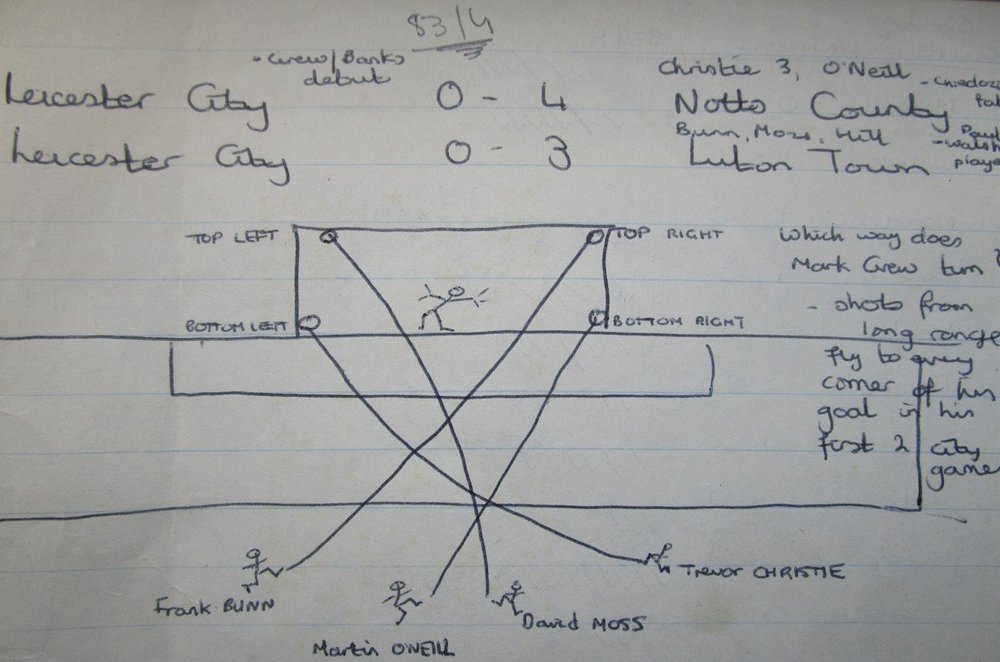
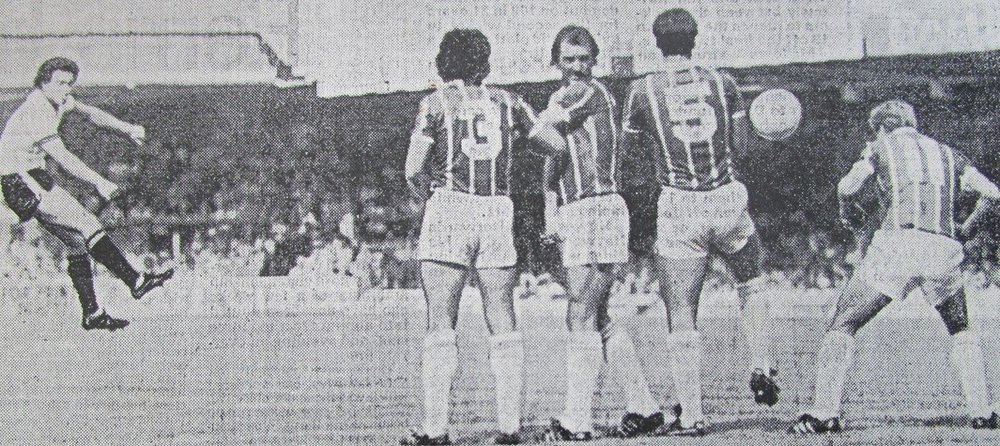



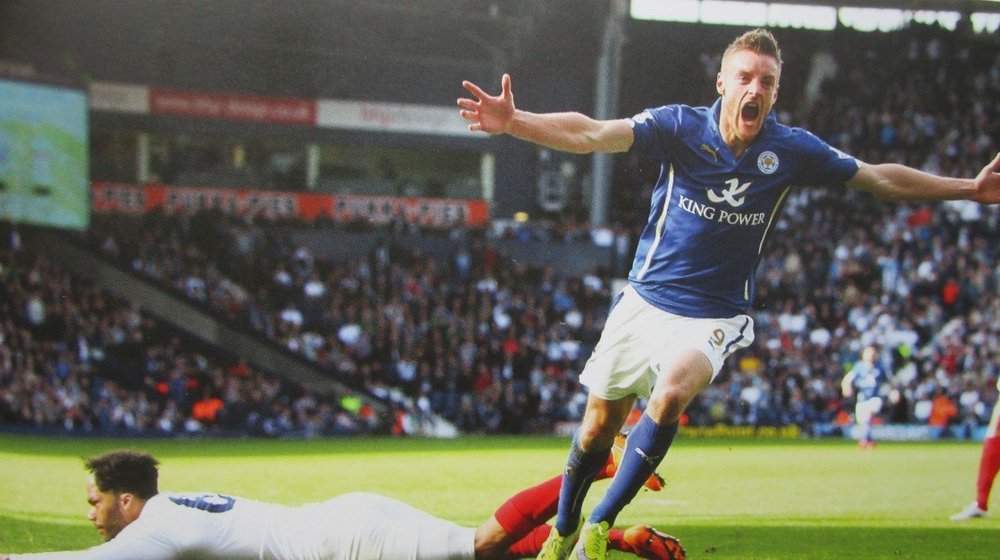

Recommended Comments
Join the conversation
You can post now and register later. If you have an account, sign in now to post with your account.
Note: Your post will require moderator approval before it will be visible.